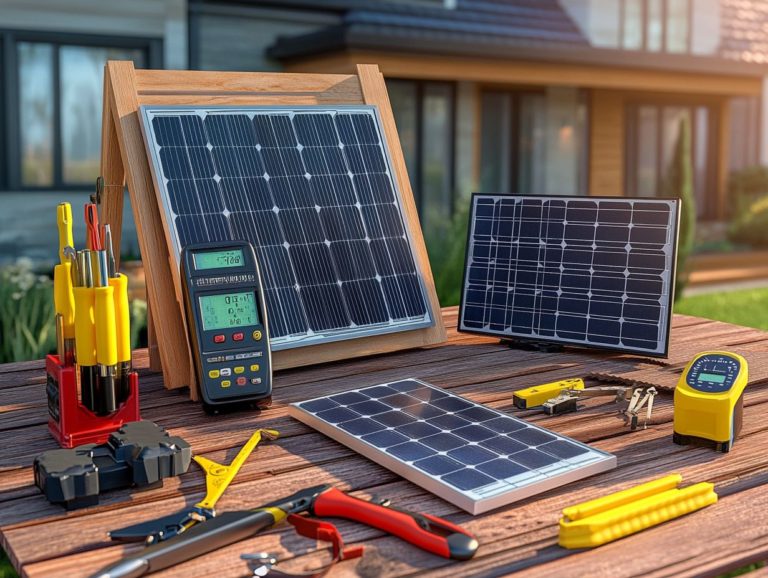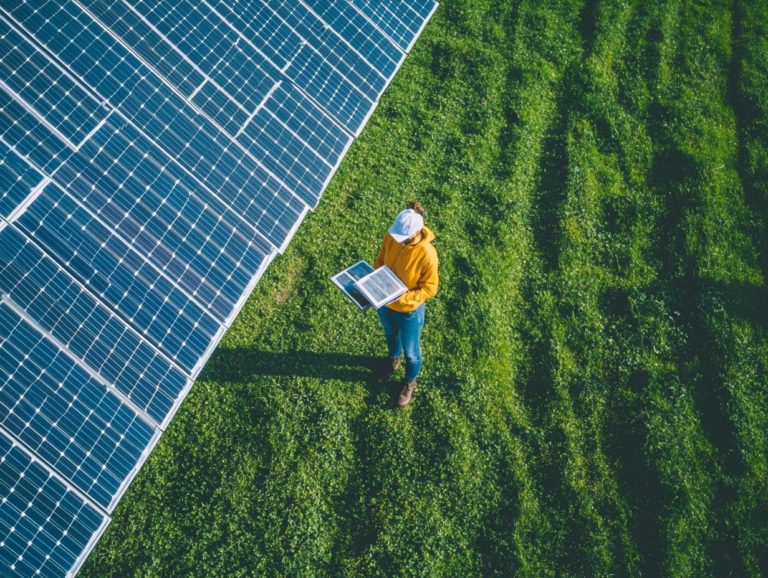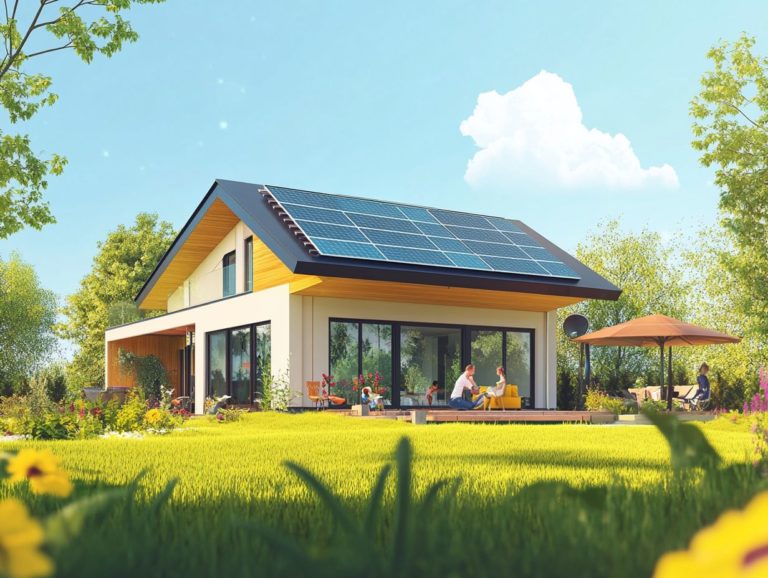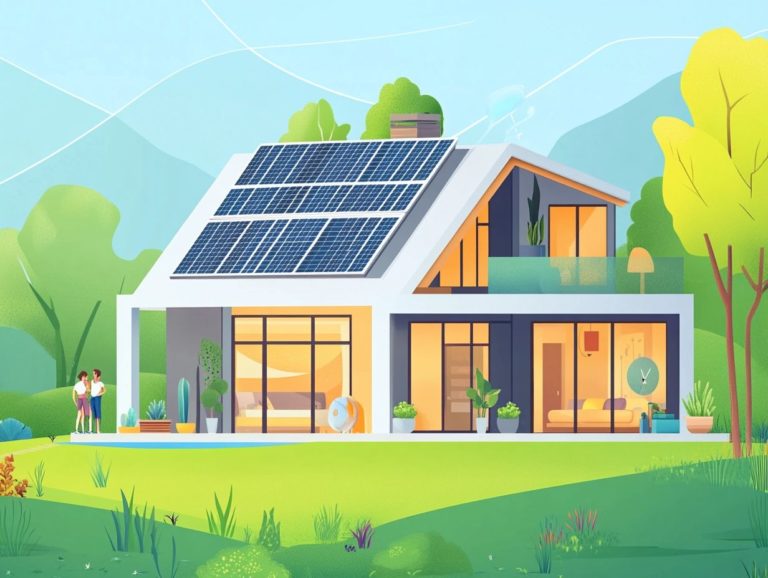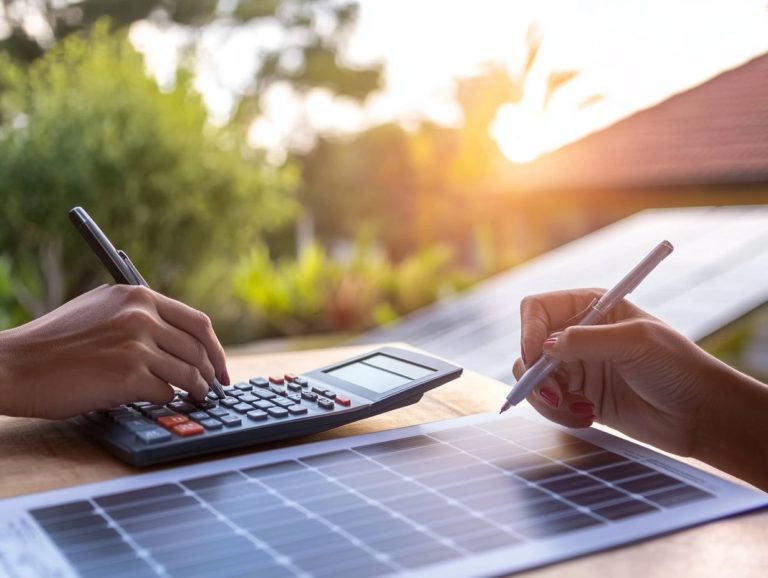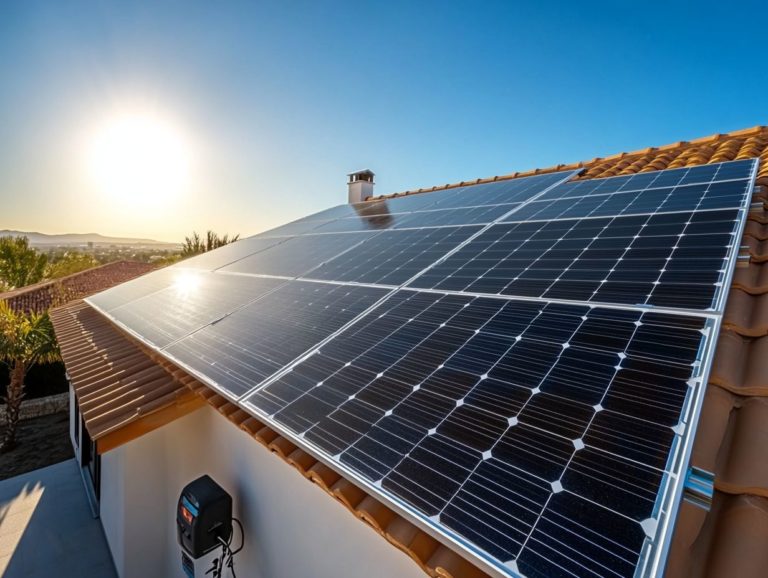“5 Common Solar Energy Mistakes to Avoid”
As you embark on the journey towards solar energy, it’s crucial to navigate this path with care and insight.
Embracing solar can dramatically lower your energy bills and reduce your carbon footprint, but overlooking key factors might lead to costly mistakes. This article outlines five common pitfalls to steer clear of, from miscalculating your energy needs to neglecting essential maintenance.
This article also covers various aspects of solar energy, including different types of solar panels, available financial incentives, and savvy tips to maximize your savings. Arm yourself with the knowledge necessary to fully capitalize on your solar investment!
Contents
Key Takeaways:
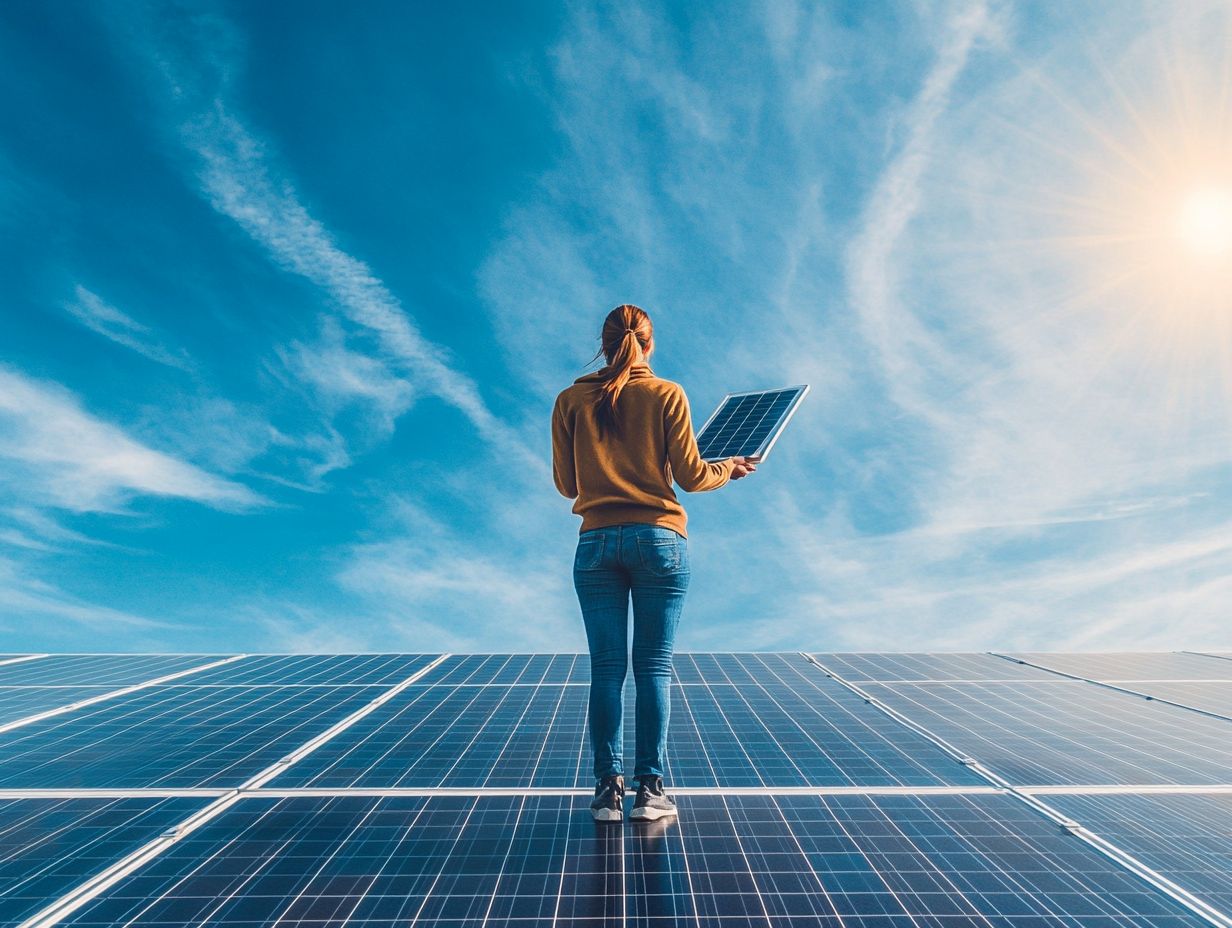
Consider your energy needs before investing in solar ensure the right system size for maximum savings.
Research solar companies don t settle for just any contractor to find the best fit for your needs and budget.
Understand the costs and savings of solar energy to make an informed decision.
Properly maintain your solar panels to ensure they are functioning efficiently and to maximize their lifespan.
Check for available incentives and rebates to reduce the cost of going solar.
1. Not Considering Your Energy Needs
When you embark on the journey to install solar panels, one of the most critical mistakes you can make is failing to thoroughly consider your energy needs. This oversight directly impacts system sizing and energy production efficiency, potentially leading to performance issues that could affect the overall success of your project.
Being mindful of your current and future energy consumption patterns is essential for effective solar panel installation. A precise analysis allows you to identify your peak usage times, enabling you to select solar solutions that meet your immediate needs and anticipate future expansions, such as adding electric vehicles or home upgrades.
This proactive approach ensures that the system you install is appropriately sized, maximizing efficiency and reducing long-term expenses associated with underperforming systems.
2. Not Doing Enough Research on Solar Companies
A common mistake homeowners make when investing in solar panels is failing to conduct adequate research on solar companies. This can result in subpar installation quality and dissatisfaction with the overall performance of their solar energy systems.
It’s essential to check solar contractors by diving into customer reviews, checking industry certifications, and examining robust warranty offerings.
Reliable reviews shed light on the experiences of previous clients, while reputable certifications showcase a company’s expertise and commitment to industry standards. Understanding the scope and terms of warranties is vital; it safeguards your investment and ensures long-term peace of mind.
By staying well-informed, you can pinpoint trustworthy contractors who promise efficient installations and enhance the overall benefits of solar energy, maximizing performance and savings in the long run.
3. Not Understanding the Costs and Savings
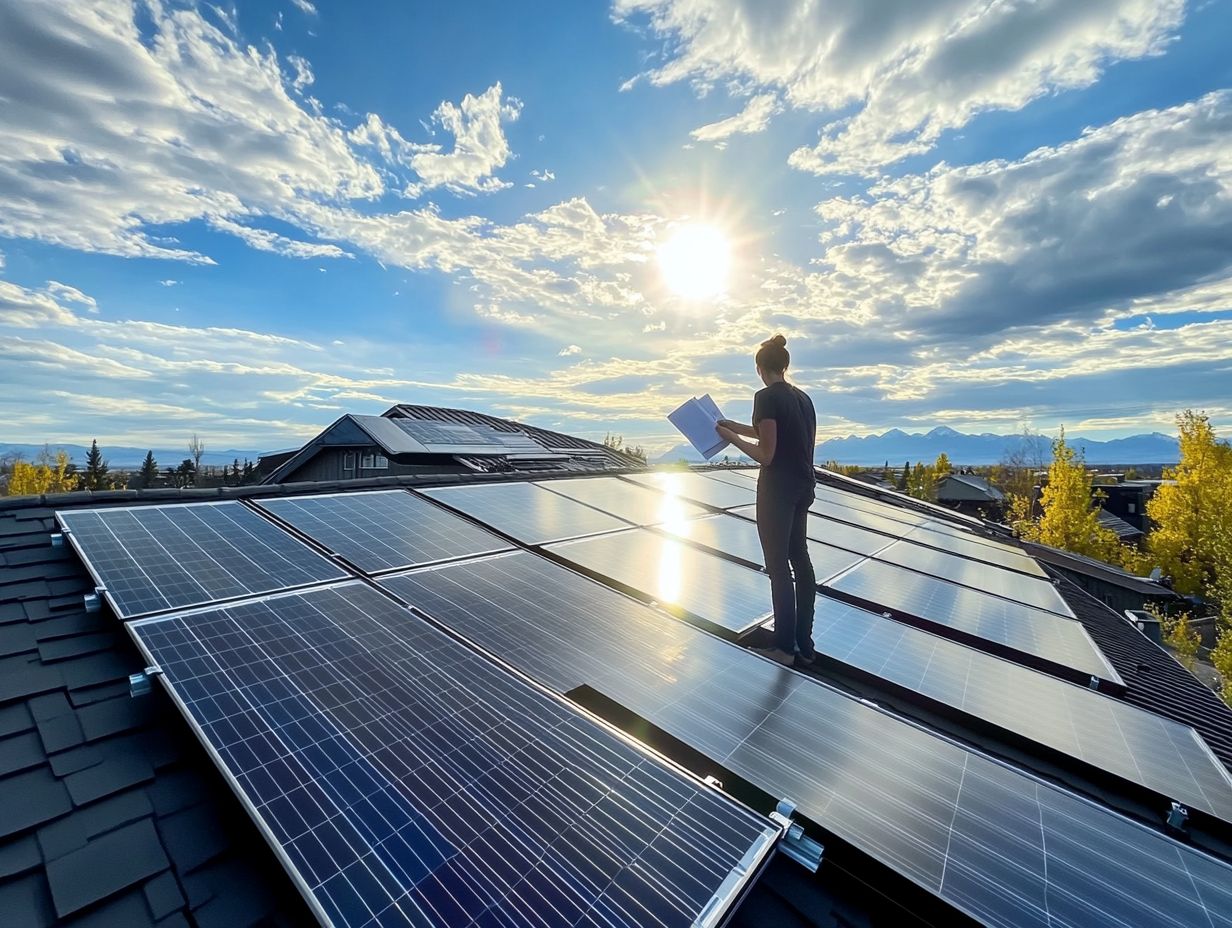
Many homeowners often overlook the crucial need to understand both the initial costs and potential long-term savings tied to solar panel installation. This mistake can lead to wasted money and an investment in solar energy that doesn’t quite align with their financial aspirations.
By taking the time to evaluate not only the upfront expenses of purchasing and installing solar panels but also considering potential financing options like loans or leases, you can significantly enhance the overall affordability of solar energy. It s essential to weigh these financial commitments against the prospective energy savings your system could generate over its lifespan.
Analyzing the cost-effectiveness of various solar technologies will help you pinpoint the solution that best meets your specific needs. Don t forget to factor in available incentives and rebates; these can dramatically reduce your total investment, guiding you toward a more sustainable and financially sound decision.
4. Not Properly Maintaining Your Solar Panels
Neglecting solar panel maintenance can hurt their efficiency. This mistake undermines the benefits of your solar energy system.
Make sure to prioritize essential tasks like regular cleaning. This eliminates dirt and debris that can block sunlight and affect your energy output.
Inverter maintenance is crucial. This device changes solar energy into electricity for your home, and ensuring it operates correctly can save you from expensive repairs.
Performance monitoring is vital as well. Keeping tabs on your energy production levels allows for early detection of potential issues.
By following these maintenance practices, you can extend the lifespan of your solar system and maximize its efficiency. This ensures you fully enjoy the environmental and financial benefits of your investment.
5. Not Checking for Available Incentives and Rebates
Overlooking available incentives and rebates can be a costly mistake for homeowners considering solar energy. These financial programs can significantly reduce installation costs and enhance the overall value of your solar investment.
Navigating the intricate web of federal, state, and local incentives is essential. This makes solar energy more budget-friendly.
For example, federal tax credits allow you to deduct a percentage of installation costs from your taxes. Many states also offer additional rebates to boost your savings.
Some local programs might provide grants or low-interest loans for solar installations. To maximize these financial benefits, research your options through government websites and local energy agencies.
Consulting with knowledgeable solar providers can also help streamline the application process.
What Are the Benefits of Solar Energy?
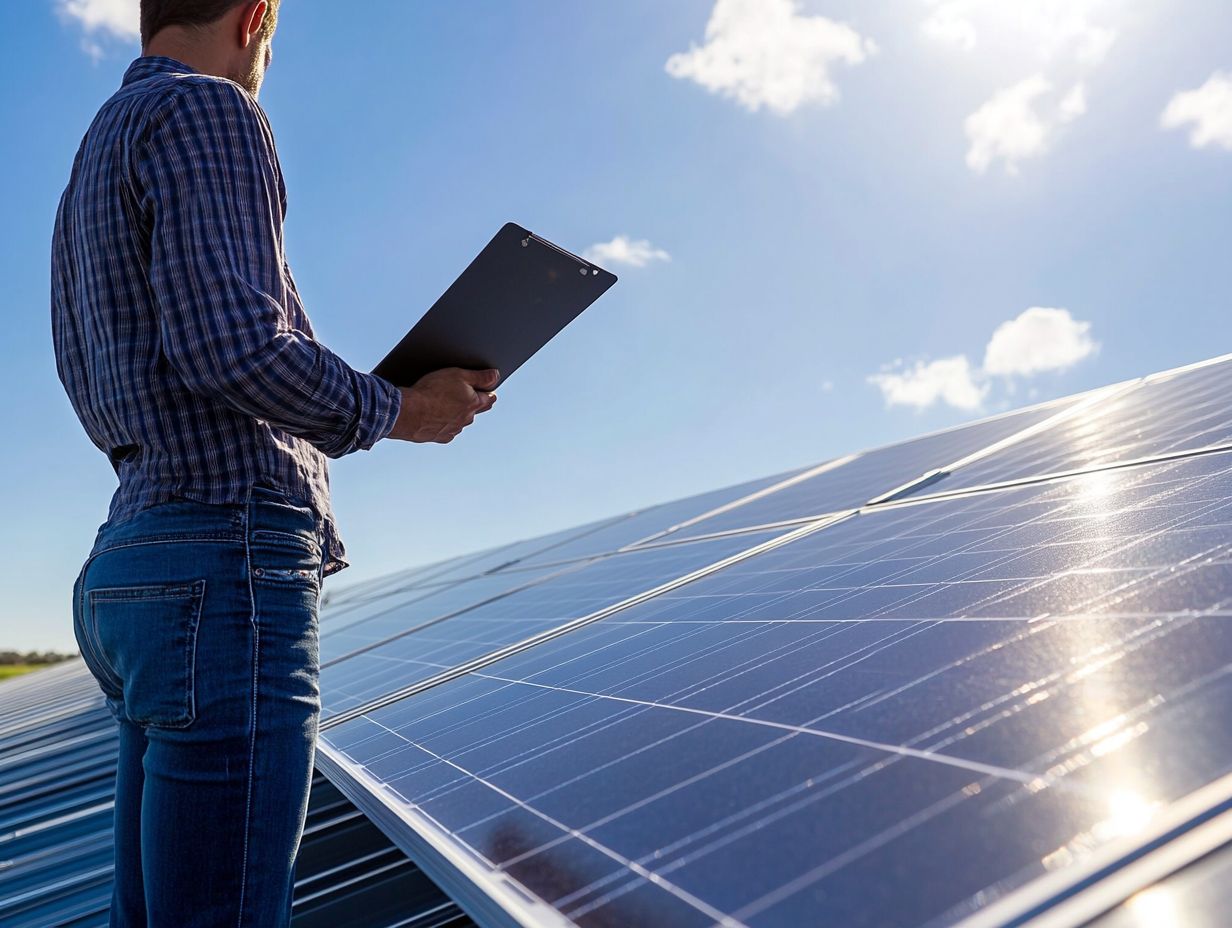
The benefits of solar energy extend beyond just saving money. They include reduced energy consumption, decreased reliance on fossil fuels, and a significant contribution to a cleaner, renewable energy future for generations to come.
By harnessing solar power, you play a key role in lowering greenhouse gas emissions. This promotes a healthier planet and actively mitigates climate change.
Advancements in solar technology, like improved photovoltaic cells and smart grid integration, allow you to achieve greater energy independence by generating your own electricity.
This autonomy stabilizes your energy costs and fosters local job creation within the renewable sector.
As innovation continues to drive the evolution of solar solutions, energy storage systems ensure consistent power availability. This greatly enhances your overall quality of life and resilience against unpredictable shifts in energy markets.
How Does Solar Energy Work?
Solar energy works by transforming sunlight into usable electricity through solar panels. These panels capture solar radiation and convert it into energy using an inverter.
Grasping this process is essential for maximizing your energy production and avoiding performance hiccups.
The efficiency of solar panels depends on several factors, including their angle, orientation, and shading from nearby trees or buildings.
As a homeowner, consider the type of solar inverter you choose. This component is key for converting the direct current (DC) generated by the panels into alternating current (AC) for your home.
Regular maintenance, monitoring your energy output, and adjusting your installation according to seasonal changes can boost system efficiency.
With a thoughtful approach and attention to these details, you can ensure your solar energy system operates optimally. This leads to consistent energy savings and a smaller carbon footprint.
What Are the Different Types of Solar Panels?
You ll find three primary types of solar panels designed for residential use: monocrystalline panels, polycrystalline panels, and thin-film panels. Each comes with its own unique characteristics and efficiency ratings, allowing you to cater to your specific energy needs and budget.
- Monocrystalline panels stand out for their high efficiency, often exceeding 20%. These panels are made from a single crystal structure, making them an excellent choice if you re working with limited roof space.
- Polycrystalline panels typically fall between 15% and 17% in efficiency. While they re generally less efficient, they offer a more affordable option, making them ideal for larger installations where budget considerations take precedence over space.
- Thin-film panels are the least efficient of the trio. However, they are made from layers of materials that are very thin, allowing for installation on unconventional surfaces, making them perfect for specific applications like RVs or building-integrated photovoltaics.
Understanding these differences is crucial. It can significantly influence your energy production and overall system performance, enabling you to make informed decisions about the optimal solar solution tailored to your needs. Choose the right type of solar panel to get the most out of your investment!
What Are the Key Factors to Consider When Going Solar?
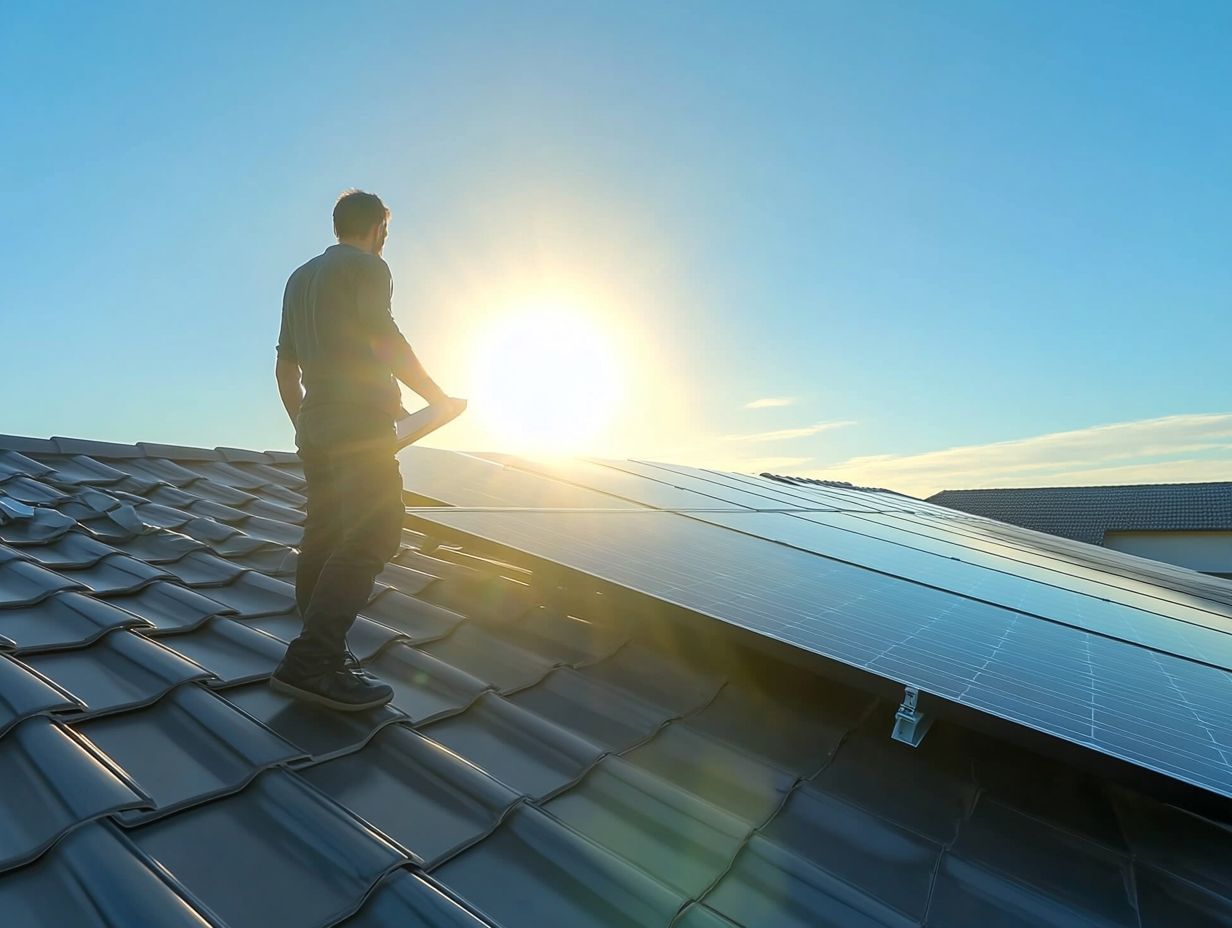
When you re considering a transition to solar energy, it s essential to evaluate key factors such as the installation process, adherence to local building codes, and a shading analysis of your property. Additionally, have a clear understanding of your energy consumption patterns. This thorough assessment will lay the groundwork for a successful solar investment.
Your journey begins with a detailed site review where the solar provider inspects your location for optimal sunlight exposure. They will also identify any potential obstructions, like trees or buildings, that could cast shadows on your solar panels.
Next, focus on careful design considerations, tailoring the system to fit the available space while addressing your unique energy needs. Ensuring compliance with local building codes is crucial, as it streamlines the permitting process and enhances both system longevity and safety. A shading analysis becomes vital during this phase; it guides the best panel placement. Meanwhile, accurately assessing your energy consumption allows for designing a system that maximizes efficiency and cost savings.
How Can You Maximize Your Solar Energy Savings?
Maximizing your solar energy savings requires a blend of strategic planning, diligent maintenance, and effective performance monitoring to ensure your solar solutions are operating at their peak efficiency and providing you with the greatest financial benefits.
To do this, set a regular routine for cleaning your solar panels and inspecting connections, as dirt and debris can gradually impede performance. Use monitoring apps to track your system s output. This helps you catch any issues before they become problems!
Exploring upgrades, such as installing energy storage systems or transitioning to more efficient panel technologies, can further boost your energy production.
By implementing these strategies, you’ll not only extend the operational lifespan of your system but also unlock significant long-term financial savings, making solar energy an investment you won t regret!
What Are the Environmental Impacts of Solar Energy?
Solar energy is great for the environment! By harnessing solar power, you can significantly reduce your carbon footprint and support clean energy. This contributes to overall sustainability in energy consumption.
When you shift towards solar, your community can decrease its reliance on fossil fuels, known for emitting harmful greenhouse gases. This transition slows climate change and enhances air quality by reducing pollutants from combustion processes.
The rise of solar installations opens the door to greener job opportunities. This fosters economic growth while nurturing the planet. As solar energy gains traction, it lays the groundwork for a sustainable energy future, ensuring that future generations enjoy a cleaner, healthier environment.
Frequently Asked Questions
What are the common mistakes to avoid when using solar energy?
- Not properly sizing the system.
- Placing panels in shaded areas.
- Neglecting maintenance and upkeep.
- Not considering energy storage options.
- Not researching available incentives and rebates.
How does not properly sizing the system affect solar energy usage?
If a solar energy system is not properly sized, it may not generate enough energy to meet your household’s needs. This leads to reliance on traditional energy sources, defeating the purpose of investing in solar energy.
Why should I avoid placing solar panels in shaded areas?
Solar panels need direct sunlight to generate energy, and shading decreases their efficiency. Consider the placement of panels carefully to ensure they receive optimal sunlight throughout the day.
What are some key maintenance and upkeep tasks for solar energy systems?
Regular maintenance is essential for the longevity and efficiency of solar energy systems. This includes cleaning panels, checking connections, and monitoring energy production. It’s recommended to consult a professional for maintenance.
Should I consider energy storage options when investing in solar energy?
Energy storage options, like batteries, allow you to store excess energy generated by solar panels for later use. This reduces reliance on traditional energy sources and increases the overall efficiency of your system.
How can I ensure I’m taking advantage of available incentives and rebates for solar energy?
Researching and staying updated on available incentives and rebates for solar energy is crucial. This can help you save money on the initial cost of the system and provide ongoing savings on energy bills.
Explore solar options today!

